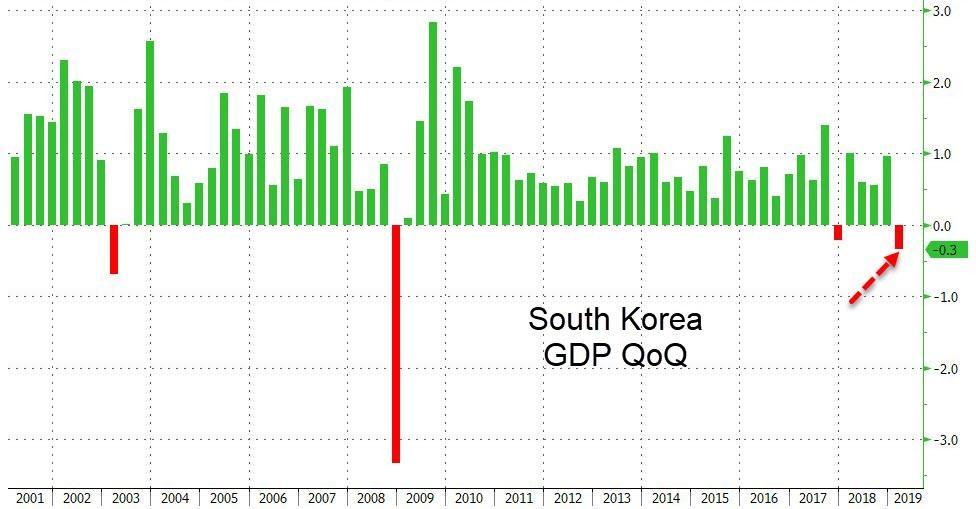A few months back, we warned that one of the most-followed belwethers for global growth has just flashed a warning sign that was impossible to ignore: South Korea’s GDP contracted 0.3% QoQ in Q1, a sign that declining investment and exports were beginning to take a toll on Asia’s fourth-largest economy, and the broader region.
One quarter later, and exports across the region have continued to weaken as global trade contracts, which is perhaps why the Bank of Korea on Thursday decided to try and get ahead of the curve and surprise the market by cutting its base rate for the first time since 2016, joining a wave of central banks that have been cutting rates as the global economy slows (Indonesia’s central bank also cut rates for the first time in nearly two years on Thursday).
Here’s the FT:
The quarter-point cut to 1.5 per cent came after pressure mounted on the BoK to act quickly to prop up the country’s slowing economy following its worst quarterly contraction since the global financial crisis in the first three months of this year, and deteriorating conditions since then.
Seoul is locked in a trade row with Tokyo, which has seen Japan tighten curbs on chemical shipments needed for production of semiconductors, South Korea’s biggest export item.
“Economic circumstances have deteriorated since April…With the rate cut, we took into account the effects from Japan’s trade restrictions,” BoK governor Lee Ju-yeol told a news conference on Thursday.
Unfortunately, a cut that the policy makers at the BOK probably viewed as a prescient decision is already beginning to look more like a mistake, as local markets appear to be far more concerned with whatever inspired the rate cut.
After all, the BOK also slashed its growth target for this year to 2.2% from its previous forecast of 2.5%, and lower than the government’s forecast of 2.4%. By comparison, South Korea’s economy grew by 2.7% last year.
In response, the Kospi slid, Korean bonds rallied, and the won strengthened 0.4% against the dollar. The move reverberated across the region, and global markets, as the MSCI Asia Pacific dropped 0.7% and Japan’s TOPIX dropped 2%. In the US, S&P futures were off 0.7%.
Exports, a major driver of South Korea’s economy (particularly the all-important semi-conductors) have fallen for the past seven months, and continued trade friction between the US and China (and South Korea and Japan) will likely continue to take a toll, seeing as the trade spat between the two largest economies is unlikely to end any time soon.
Economists expect more rate cuts to follow later in the year. Will the market take to monetary easing? Or is there more unrest ahead. We’ll have to wait and see.
via ZeroHedge News https://ift.tt/2JGTc8N Tyler Durden
